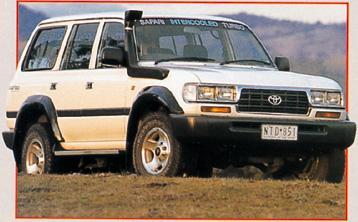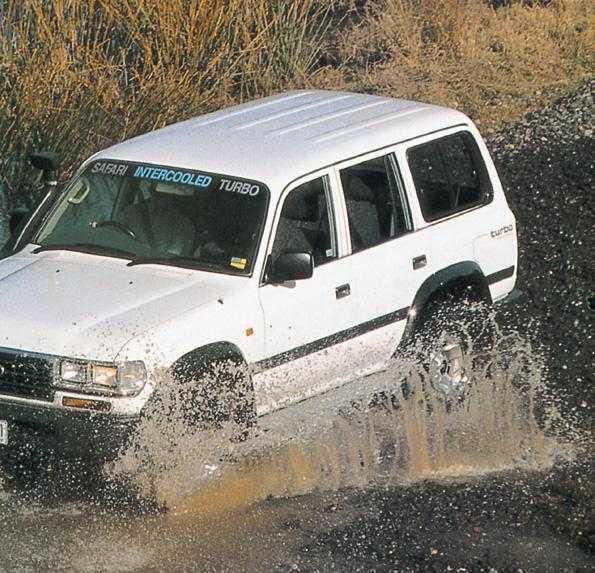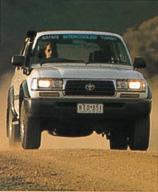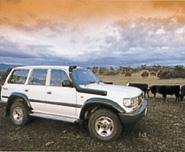![]()

 |
SAFARI INTERCOOLER SYSTEM REVIEW -
OVERLANDER MAGAZINE - September 1996 |
The Safari Turbo Systems Intercooler was developed by Safari 4X4 Engineering Pty Ltd for the 1HD-FT principally to improve its' torque between 1000 rpm and 2500 rpm. The Safari modification includes fitment of an Intercooler unit |
 |
||||
 |
The Safari Intercooler together with fuel metering changes and high output exhaust improves the Landcruiser 1HD-FT's performance, especially at low rpm (above and left). |
 |
|
and associated plumbing, changes to fuel metering and as an option, a high output exhaust system can be fitted. It is not a kit that can be fitted by the home mechanic; an Authorised Safari Turbo Systems agent will have to fit the Intercooler kit and they have the correct equipment to alter fuel metering to maximise performance while keeping emissions legal. The Intercooler unit is the same as used on the Safari Turbo Systems intercooled 1HD-T tested in the March '96 issue on page 89. However, the 1HD-FT does use its' own ducting design, so the two kits are not interchangeable. Like the 1HD-T, the 1HD-FT intercooler unit installation requires minor modification of the radiator support panel and right front inner guard. The intercooler is fabricated from aluminium and has internal cooling fins, and the kit comes with all the associated hardware needed, including moulded rubber air ducts, all fitting screws and brackets. The 1HD-FT engine greatly benefits from the Safari Intercooler installation with inlet manifold temperature down from 115ºC to 60ºC and together with fuel metering changes and a 3 inch mandrel-bent high-output exhaust fitted, the Safari Turbo Systems 1HD-FT improves peak power output by a claimed 30 per cent. The Safari-improved 1HD-FT feels like a very different vehicle to drive compared with the factory-standard model. Power delivery is strong from idle, in sharp contrast to the sluggish off-idle response of the standard vehicle. If you want to you can take off from a standing start in second gear, the vehicle |
| moving
off smoothly, relying on its' copious amounts of torque.
The strongest aspect of the conversion is its' ability to provide enormous flexibility from idle to redline. While the Luxon-modified vehicle does not feel like it provides instantaneous acceleration from idle, it does gather momentum  |
 progressively from 800 to 200 rpm, at which point it springs forward. At about 3500 rpm power tails off, but the engine is still eager to rev to the 4300 rpm redline. With peak torque occurring at 1500 rpm, the Intercooled 'Cruiser can be driven around town relying on third and fourth gears only. On the highway the 'Cruiser seems too low geared, the engine spinning at 2550 rpm at 100/km/h. We briefly drove a Safari modified automatic 1HD-FT 'Cruiser and can report that it feels more relaxed sitting |
on
about 2200 rpm at 100 km/h. While the Intercooler, fuel delivery and exhaust
changes give the 1HD-FT 'Cruiser unsurpassable flexibility and performance,
it also highlights the inadequacies of the standard Toyota transmissions.
While there is no doubt about their durability, the manual is slow shifting
and truck like to operate. Our acceleration times show the 'Cruiser to
be quick but it would be perhaps even a second quicker if the driver didn't
need to pause in neutral during upshifts. The auto version is on occasions
not particularly smooth to drive with kick down coming in abruptly.
Complaints with the manual transmission aside, with the 'Cruiser's new found flexibility you can pick a gear and almost leave it there - you can leave it in fifth gear for example and it will surge forward almost as quickly as it will in fourth. Our 80-100 km/h roll on acceleration times reflect this; while in third gear it will sprint through this increment in 3.1 seconds, in fourth it took 4.6 seconds and in fifth it only took 4.8 seconds. Standing start figures put the Safari modified vehicle up there with the best of the standard petrol4WDs, and make it a veritable rocket ship for a heavy duty turbo diesel. From rest to 80km/h the 'Cruiser took 8.43 seconds while the 100km/h mark was reached in 12.2 seconds. Fuel economy does not suffer despite the performance boost. An easy run down the Hume Highway cruising on 110km/h saw the 'Cruiser achieve an average of 12.7 1/100km. Even when driving on more challenging mountainous roads and doing performance testing, the intercooled 'Cruiser achieved 14.1 1/100 km. As a tow vehicle (for towing impressions of the intercooled 1HD-FT), see last months Overlander, page 54), outback tourer or off road trail climber the intercooled 'Cruiser is eminently suitable. For its' sheer performance and perhaps more importantly its' inspiring flexibility, the Safari Intercooled 1HD-FT 'Cruiser is a package hard to ignore. |
 Developed by Luxon's, the Safari intercooled conversion includes all the necessary ducting and associated hardware; the Safari Intercooler unit (below) is the key to the 1HD-FT's performance improvement. |
||
 |
||
